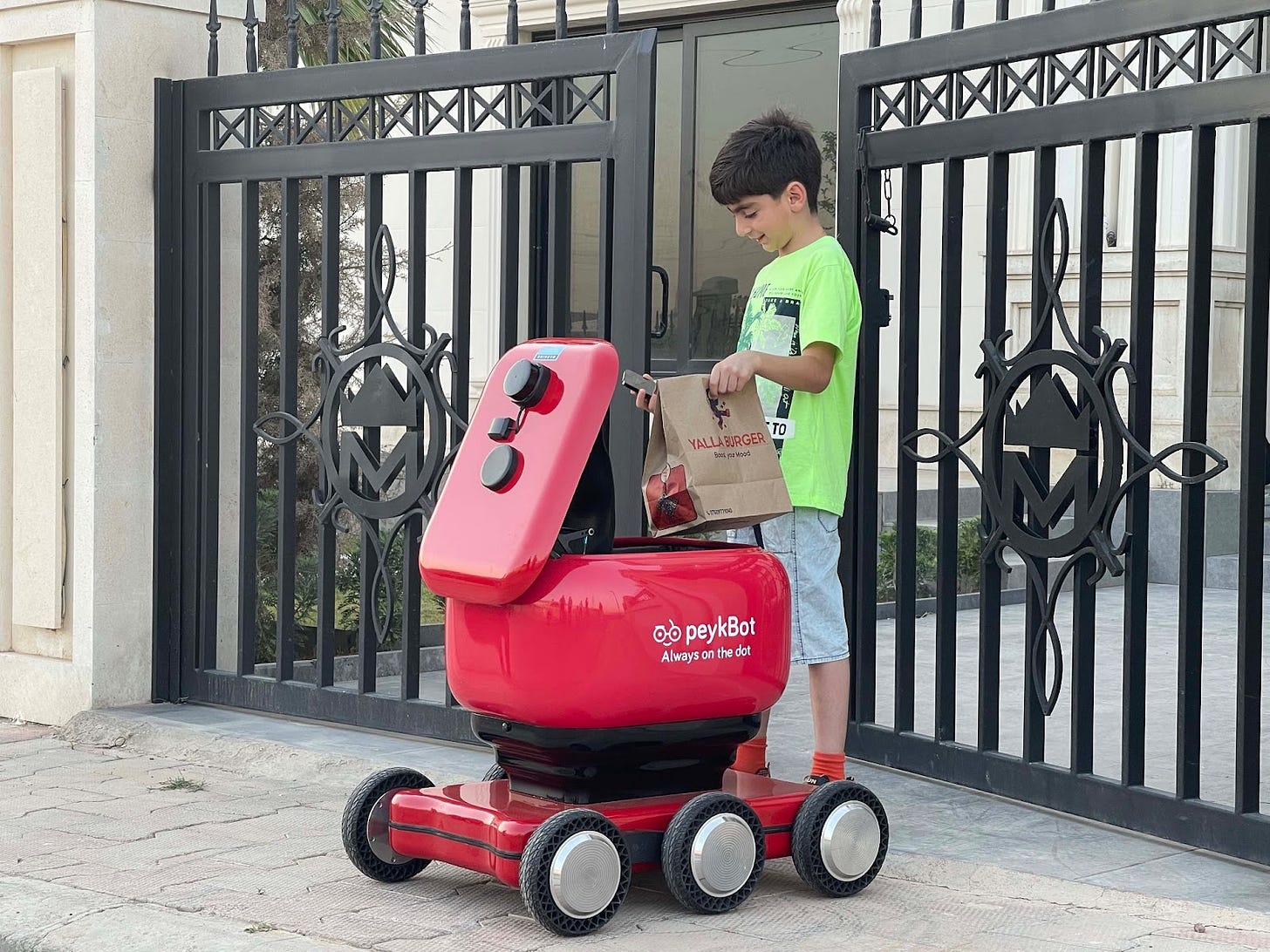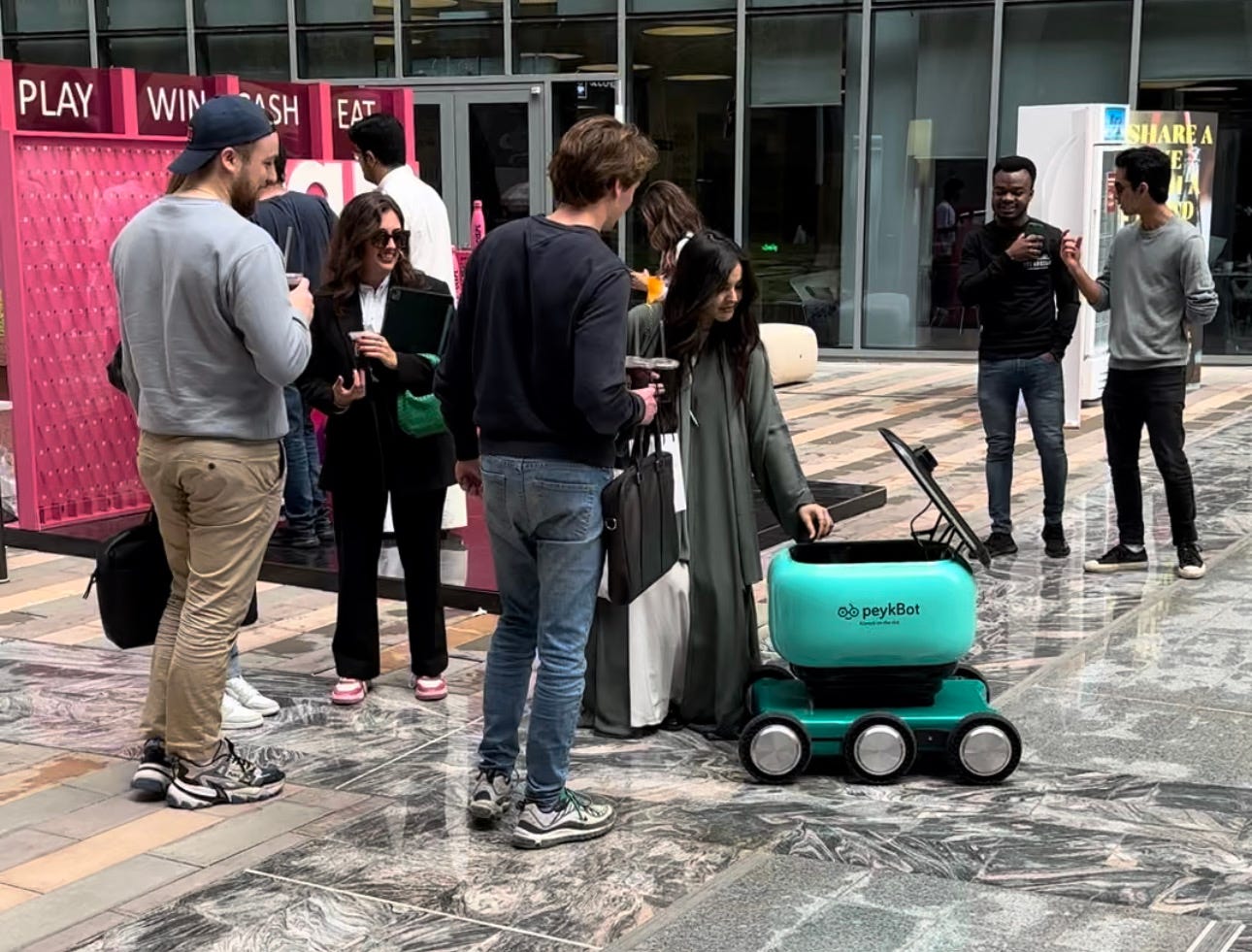PeykBot Is Ready to Deliver in Saudi Arabia, the UAE and UK
Founder Salman Moghimi discusses pivots, fundraising, regulations and how to operate in the GCC
While we’ve gone deep into the delivery robotics landscape, much of OttOmate’s recent coverage has focused on the United States. That’s why I’m excited about today’s interview with Salman Moghimi, Founder & CEO of Peyk. Peyk started 2018 as a London-based peer-to-peer, courier-powered delivery service. With Brexit evaporating a large part of Peyk’s labor pool, he pivoted the business to focus on delivery robotics. With that new business model in hand, his team has taken Peykbot not only across the U.K., but to Qatar, the UAE, Kuwait, Iraq and soon Saudi Arabia. Read on for Salman’s thoughts on operating in those regions, the macro regulatory and financing environments, and how he pivoted into such a hardware-intensive category.
Jonah Bliss: Why don’t we start with some background; tell us a bit about the founding team, and what led you to create Peyk?
Salman Moghimi: I founded Peyk at the age of 19 whilst studying at university after finding a huge gap of peer-to-peer deliveries in the market. I started from scratch with no help from family or friends and reached a team of 28 highly talented individuals and broke the record of 4,000 deliveries a day with 6,000+ freelance riders in London. After Covid-19 and Brexit, unlike many startups, I didn't fear failure and made another idea into a reality. Knowing nothing about robotics and manufacturing, but with strong dedication and commitment, after a year, PeykBot was born.
Transferring from a tech/business background to manufacturing a product was very challenging at first. I had the idea in mind, but no clue on how to start. I did not know the resources needed nor the people required to start, whether it was designers, engineers or mechanics. I had to get mentorship from the advisors around me and mostly commit the majority of my own time to researching what is required as the first step.
Today, the team includes highly skilled individuals from C-level members, alongside our experienced team of 28 talented individuals, to senior mechanical engineers, composites engineers, mechatronics engineers, electronic and control engineers, AI and ROS developers, server and backend developers. A tech team does not get completed without marketing; we have an experienced CMO alongside a business development officer with strong start-up and manufacturing backgrounds to make sure the product is well sold within the market.
JB: How would you say PeykBot is different from the competition?
SM: PeykBot is designed by a delivery company rather than a robot manufacturer and that means we’ve been thinking differently from the very first day. As delivery experts, we knew what is operationally challenging and what is truly needed by society. For us, a delivery is not getting a parcel from A to B. It is the experience we provide from the very first moment the user visits our app to the moment they receive their parcel. In PeykBot, we used the same mindset to design a robot that can leave a lasting mark within the industry. As an example, PeykBot is the first delivery robot that is built on a modular design. To fulfil deliveries on a different scale, we had to make sure the PeykBot is practical for everyone. The modular design allows us to change the compartment storage size in less than 5 minutes. I.e. laundry can have deliveries with larger storage where clothes can be hung straight and groceries can have wider space for extra practicality.
“PeykBot is designed by a delivery company rather than a robot manufacturer and that means we’ve been thinking differently from the very first day.”
JB: What’s your approach to robot operations: remotely piloted, autonomous operations, some combination of the two?
SM: When it comes to operating robots the biggest question manufacturers face is the legal perspective of the operations. Even though robotic deliveries are designed to have autonomy and people consider them cool; the reality is that the majority of the robots including PeykBot have no other way than including teleoperations as a part of the journey. That is not due to lack of technology, it is mainly from the regulations and public safety perspective at the current moment. We believe that the industry has decided to go for an incremental approach in operating autonomy fairly because of not losing their time at status quo and to ensure complex technological challenges are significantly resolved until then.
JB: Which markets do you see Peyk initially operating in? How did you choose those regions?
SM: Peyk has been a delivery platform in London for the last 4 years with a strong reputation as well as partnerships with thousands of local boutiques and brands. The U.K. is our hometown and place where PeykBot was designed and born. Hence, it is a definite market for us to deploy the robots in. However, alongside our subsidiary company in Qatar, we have selected the GCC (Gulf Cooperation Council) as the most ideal region for us to commence real robotic delivery trials. So far the PeykBot has been trialled and used by different logistic partners in Qatar, the UAE, Kuwait and Iraq. With this region currently being the most tech and startup friendly, PeykBot has been highly appreciated by the locals.
JB: Who are you targeting for business development: 3PDs, food service groups, end user restaurants, courier firms?





